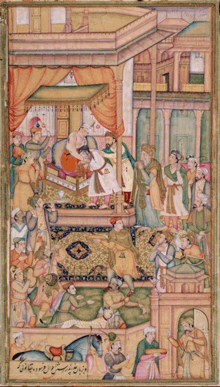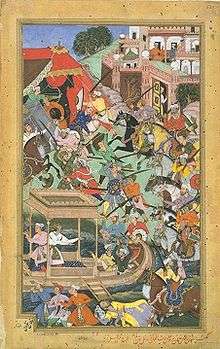Bairam Khan
| Bairam Khan | |
|---|---|
 The submission of Bairam Khan, 1560. | |
| Regent of the Mughal Emperor | |
|
In office 1556 – 1560[1] | |
| Monarch | Akbar |
| Personal details | |
| Born |
c. 1501[2] Badakhshan |
| Died |
31 January 1561 (aged 59–60) Patan, Gujarat, (modern-day India) |
| Spouse(s) |
Jamal Khan's daughter (m. 1554–1561)[3][4] Salima Sultan Begum (m. 1557–1561)[5] |
| Children | Abdul Rahim |
| Profession | Chief advisor of Akbar, Military commander and commander-in-chief of Mughal army and Mughal Statesman |
| Military service | |
| Allegiance | Mughal Empire |
| Years of service | c. 1517-1561 |
| Commands | Mughal Army |
| Battles/wars |
Battle of Khanwa Battle of Ghaghra Siege of Sambhal Second Battle of Panipat |
Bairam Khan also Bayram Khan (c. 1501 – c. 31 January 1561) was an important military commander, later commander-in-chief of the Mughal army, a powerful statesman and regent at the court of the Mughal Emperors, Humayun and Akbar. He was also guardian, chief mentor, adviser, teacher and the most trusted ally of Akbar.[6] Humayun honored him as Khan-i-Khanan, which means "King of Kings". Bairam was originally called Bairam "Beg", but later became honored as 'Kha' or Khan.[7][8]
Bairam Khan was an aggressive general who was determined to restore the Emperor’s authority over the Mughal Empire.[6]
Early life and ancestors
Bairam Khan was born in the region of Badakhshan in Central Asia, and belonged to the Baharlu Turkoman clan of the Kara Koyunlu confederation.[9][10] The Kara Koyunlu had ruled Western Persia for decades before being overthrown by their Ak Koyunlu rivals. Bairam Khan's father Seyfali beg Baharlu and grandfather Janali beg Baharlu had been part of Babur's service.[7] His great-grandfather was Pirali beg Baharlu, a brother to Babur's wife Pasha Begum[11] and son-in-law of Qara Iskander.[12]
Military service
Bairam entered Babur's service at the age of 16 and played an active role in the early Mughal conquests of India.[13] Bairam Khan later contributed greatly to the establishment of the Mughal empire under Humayun when he was entrusted with the position of muhardar (keeper of the seals) and took part in military campaigns in Benares, Bengal and Gujarat.[13] He accompanied Humayun during his exile in Persia and helped conquer Kandahar before serving as its governor for nine years. In 1556, he played a leading role as a commander in Humayun's reconquest of Hindustan.[14]
Following Humayun's death in 1556, Bairam Khan was appointed regent over the young monarch Akbar. As regent, he consolidated Mughal authority in northern India and most notably led the Mughal forces at the Second Battle of Panipat, which was fought between Akbar and Hemu in November 1556.
Later years
Bairam Khan was a Shia Muslim and was disliked by the Sunni Turkic nobles.[15] Although a Shia, he attended Friday services in the mosque of a noted Sufi and was also responsible for Shah Gada, the son of Sikandar Lodi's court poet Jamali Kanboh, becoming sadr-as-sudr in the Mughal Empire after Humayun's return to Delhi in 1555.[16]
Marriages
Gazetteer of Ulwur states:
Soon after Babar's death, his successor, Humayun, was supplemented by Sher Shah in 1540 A.D., later followed by Islam Shah in 1545 A.D. During the reign of the latter, a battle was fought and lost by the Emperor's troops at Firozpur Jhirka in Mewat, on which, however, Islam Shah did not lose his hold. Adil Shah, the third of the Pathan interlopers, who succeeded in A.D. 1552, had to contend for the Empire with the returned Humayun.[17]
In these struggles for the restoration of Babar's dynasty Khanzadas apparently do not figure at all. Humayun seems to have conciliated them by marrying the elder daughter of Jamal Khan, the nephew of Babar's opponent Hasan Khan Mewati, and having his minister, Bairam Khan, marry Jamal's younger daughter.[18] Bairam's other wife was Salima Sultan Begum, who married Akbar after his death.[19]
Death

Due to a difference in opinion with Bairam Khan, Akbar told him that he could either retire and stay in the palace or go on the hajj pilgrimage to Mecca. On his way, his opponents goaded him to rebel,[20] but he was defeated in the Punjab. Akbar gave him the option of staying in the court as an advisor or continuing his pilgrimage. Bairam chose the latter.[21] While traveling through Gujarat he was killed.[22] It came about when Bairam Khan was at Sahastralinga Tank, a religious site near Anhilwad Patan, and was recognised by Lohani Pashtun, an associate of Haji Khan Mewati. Upon learning of this, Haji Khan planned his attack and killed Bairam Khan in order to take revenge for Emperor Hemu's death. Haji Khan Mewati was from Alwar and he had been a general of Hemu, and had been staying at Patan, after his defeat by Akbar's forces and the capture of Alwar Sarkar in 1559.
Bairam Khan died on 31 January 1561. However, his son and wife were allowed to go free and were sent to Agra. Bairam Khan's wife, who was also the cousin of Akbar, married Akbar after Bairam Khan's death. Bairam's son, Abdul Rahim Khan-I-Khana, became an important part of Akbar's administration and was one of the nav-ratans (nine gems) of Akbar's court.
Notes
- ↑ Chandra, Satish (2005). Medieval India : from Sultanat to the Mughals (Revised ed.). New Delhi: Har-Anand Publications. p. 95. ISBN 9788124110669.
- ↑ "The Indian Historical Quarterly". 25-26. Calcutta Oriental Press. 1949: 318. Retrieved 13 August 2017.
- ↑ "Bibliotheca Indica". 202. Baptist Mission Press. 1848. Retrieved 13 August 2017.
- ↑ Cunningham, Sir Alexander (1885). Report of a Tour in Eastern Rajputana in 1882-83. Office of the Superintendent of Government Printing. p. 21.
- ↑ (Begam), Gulbadan (1974). Humāyūn-nāma. Sange-Meel Publications distributors, Islamic Book Service. p. 57.
- 1 2 editor, Alexander Mikaberidze, (2011). Conflict and Conquest in the Islamic World a Historical Encyclopedia. Santa Barbara: ABC-CLIO. p. 707. ISBN 9781598843378.
- 1 2 Thackston, Wheeler M. (2002) The Baburnama: Memoirs of Babur, Prince and Emperor The Modern Library, New York, p.xix, ISBN 0-375-76137-3
- ↑ Ahmed, Humayun,(2011) Badsha Namdar, National Library, Dhaka, pp.200-233. ISBN 978-984-502-017-6
- ↑ Schimmel 1980, p. 77.
- ↑ Ansari 1989, pp. 3-5.
- ↑ Baburnama (PDF). p. 251.
- ↑ "Baharlı soyadının ilk daşıyıcısı". Azadliq (in Azerbaijani). Retrieved 2017-05-06.
- 1 2 Ray, Sukumar & Beg, M.H.A. (1992) Bairam Khan, Mirza Beg, 1992, page 11, ISBN 969-8120-01-7
- ↑ Ray, Sukumar & Beg, M.H.A. (1992) Bairam Khan, Mirza Beg, 1992, page 27, ISBN 969-8120-01-7
- ↑ Richards, John F. (1993). The Mughal Empire. The New Cambridge History of India Location=Cambridge, England. Cambridge University Press. p. 13. ISBN 978-0-521-25119-8.
- ↑ Schimmel, Annemarie (1980). Handbuch der Orientalistik. Leiden: Brill. p. 77. ISBN 9789004061170.
- ↑ Full text of "The Imperial Gazetteer of India, Volume- XXI. Retrieved 2014-01-11.
- ↑ https://archive.org/stream/gazetteerofulwur00powliala#page/8/mode/2up (pages 7 + 8)
- ↑ Gulbadan, Begam; Beveridge, Annette S. (1972). The history of Humayun = Humayun-nama. Begam Gulbadam. p. 278.
- ↑ Chandra 2007, p. 227
- ↑ Rahim-Abdul Rahim Khankhanan at Indiagrid Archived 13 July 2011 at the Wayback Machine.
- ↑ Bose, Mandakranta, ed. (2000). Faces of the Feminine in Ancient, Medieval, and Modern India. New York: Oxford University Press. p. 205. ISBN 978-0-19-512229-9.
Sources
- Ansari, N.H. (1989). "BAYRAM KHAN". Encyclopaedia Iranica, Vol. IV, Fasc. 1. pp. 3–5.
- Schimmel, Annemarie (1980). Islam in the Indian Subcontinent. BRILL. ISBN 978-9004061170.
Further reading
English
- Singh, Damodar (2003) Khan-i-Khanan Bairam Khan: a political biography Janaki Prakashan, Patna, India, OCLC 54054058
- Shashi, Shyam Singh (1999) Bairam Khan : soldier and administrator (Series Encyclopaedia Indica volume 58) Anmol Publishing, New Delhi, India, OCLC 247186335
- Pandey, Ram Kishore (1998) Life and achievements of Muhammad Bairam Khan Turkoman Prakash Book Depot, Bareilly, India, OCLC 5007653.
- Ray, Sukumar (1992) Bairam Khan Institute of Central and West Asian Studies, University of Karachi, Karachi, Pakistan, OCLC 29564939.
Hindi
- Agravāla, Sushamā Devī (1994) Bairamakhām̐ aura usake vaṃśaja kā Mugala sāmrājya meṃ yogadāna Rāmānanda Vidyā Bhavana, New Delhi, India, OCLC 34118191, in Hindi. (Contribution of Bairam Khan, 1524?-1561, Mogul nobleman, to the Mogul Empire.)
- Devīprasāda, Munśī (2001) Khānakhānā nāmā Pratibhā Pratishṭhāna, New Delhi, India, ISBN 81-85827-89-3, in Hindi. (On the life and achievements of Bairam Khan, 1524?-1561, ruler in the Mogul Empire and Khane Khana Abdul Rahim Khan, 1556–1627, Braj poet.)
Bengali
- Ahmed, Humayun (2011) Badsha Namdar, Dhaka, Bangladesh, ISBN 978-984-502-017-6